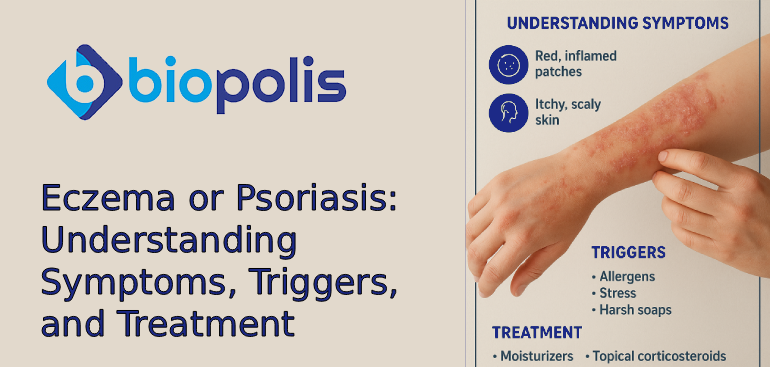Subtotal ₹0.00
The issues of the skin may manifest in the same way on the surface, yet the reasons and the methods of their management may vary considerably. Eczema and psoriasis are the most misdiagnosed conditions. These two can both impact millions of people worldwide and result in visible discomfort, irritation, and long-term skin sensitivity.
This blog explains the differences between eczema and psoriasis, describes their typical characteristics, and offers suggestions for how to manage them best.
Understanding Eczema
Eczema, also known as atopic dermatitis, is a chronic inflammatory skin condition that can manifest during early childhood but may also be encountered at any age. Environmental factors, genetics, and immune system responses contribute to it. Eczema-affected skin is often dry and sensitized, and may also be more vulnerable to irritants.
Common Signs of Eczema
Eczema may manifest itself in various ways; however, the following are the typical signs:
- Dry, rough, and flaky patches
- Intense itching, particularly at night
- Red or inflamed skin
- Small bumps, possible oozing, and crusting
- Rashes are usually found on the neck, elbow, behind the knees, and face
What Triggers Eczema?
The worsening of eczema is often due to:
- Fragrances, detergents, or soaps
- Soap, dust mites, and pollen are among the allergens
- Climate changes
- Stress and lack of sleep
- Certain fabrics, such as wool
- Food sensitivity in some people
Understanding Psoriasis
Psoriasis is a disease of the immune system that affects the skin, in which new skin cells form too quickly. The high rate of cell turnover in the skin results in scaly, thick patches called plaques. Psoriasis can begin at any age, with a higher prevalence in adult life.
Common Signs of Psoriasis
Psoriasis has more organized and acute signs than eczema:
- Thick, raised patches of skin
- Red skin with silvery-white scales on it
- Clear outlines of the patches
- Mild or moderately high itch or burning
What Triggers Psoriasis?
Psoriasis may be precipitated by:
- Stress or emotional strain
- Injuries and cuts, or skin infections
- Cold weather
- Certain medications
- Alcohol consumption
- Immune system disturbances
Key Differences Between Eczema and Psoriasis
Even though they are slightly similar, eczema and psoriasis have several significant differences:
Appearance
Eczema: Red and inflamed dry patches, along with severe itching
Psoriasis: Thick and scaly scales, silvery flakes.
Location
Eczema: It is common in the folds of skin, such as the backs of the knees, under the arms, and on the neck.
Psoriasis: It is much more common on the knees, elbows, scalp, and lower back.
Itching
Eczema: Intense and long-lasting itching
Psoriasis: It can be itchy, but mild; a burning sensation may occur
Skin Texture
Eczema: Dry, cracked skin that sometimes oozes
Psoriasis: The plaques are thickened, raised, and well-defined
How to Manage Eczema?
The management of eczema aims to restore and protect the skin barrier.
Moisturisation
A thick moisturizer applied multiple times daily can alleviate dryness and inflammation.
Avoiding Triggers
Detergents, perfumes, or fabrics can irritate sensitive skin, and you can prevent flare-ups by identifying these irritants.
Mild Cleansers
Use a mild, fragrance-free soap to bathe the skin, which helps avoid skin stripping.
Topical Treatments
Dermatologists Can Prescribe:
- Corticosteroid creams
- Medicated ointments
Lifestyle Adjustments
A good night’s sleep, stress management, and a humidifier during dry seasons also help control symptoms.
How to Manage Psoriasis?
Psoriasis is an immune-mediated condition that requires a more specific approach to be managed.
Topical Therapies
Dermatologists usually prescribe:
- Vitamin D analogues
- Coal tar preparations
- Corticosteroid creams
Light Therapy
The excessive growth of skin cells can be slowed down with controlled exposure to UV light.
Systemic Treatments
In moderate to acute cases, oral or injectable drugs can be given to help control the body.
Regular Skin Care Routine
Humid moisturizing and gentle cleaning, without hard rubbing, can help slow the growth of plaque.
When to See a Dermatologist?
- Symptoms become more severe or disseminated.
- Flare-ups become frequent
- OTC drugs are of limited use
- You observe joint pains and psoriasis spots
Eczema and psoriasis appear similar, but they are distinct in cause, form, and treatment options. Being aware of their characteristics will help you identify their signs and symptoms promptly and choose the right line of treatment. Both conditions can be managed with a proper care plan and professional advice; the skin can become healthier and more comfortable over time.




Comments are closed